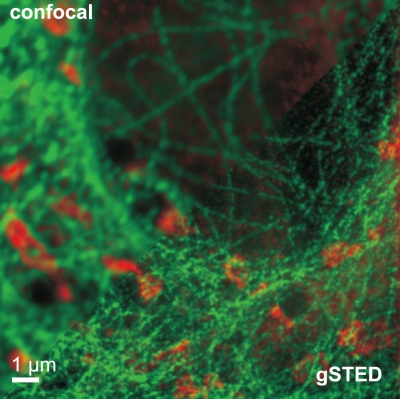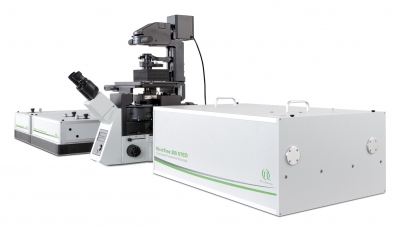December 17, 2014
gated STED increases the resolution of PicoQuant’s MicroTime 200
The gated STED technique improves the resolution of images even more than standard STED without compromising usability
 PicoQuant GmbH, specialist in single photon counting applications and fluorescence instrumentation has signed an agreement with the Max Planck Society and the German Cancer Research Center (DKFZ) to use the gated STED technology (gSTED) in the new time-resolved confocal microscope MicroTime 200 STED.
PicoQuant GmbH, specialist in single photon counting applications and fluorescence instrumentation has signed an agreement with the Max Planck Society and the German Cancer Research Center (DKFZ) to use the gated STED technology (gSTED) in the new time-resolved confocal microscope MicroTime 200 STED.
The group of Professor Stefan Hell, Director at the Max Planck Institute for Biophysical Chemistry in Göttingen, has introduced the idea of gSTED in order to improve resolution and contrast of a STED microscope even more, while distinctly reducing laser intensity. This increases photostability as well as live cell capability, substantially extending the range of possible applications. gSTED relies on a photon gating technique that can be directly applied on the data acquired with the MicroTime 200 STED leading to an improved resolution in images. gSTED also enhances the capabilities and possible applications for STED Fluorescence Correlation Spectroscopy (STED-FCS) as it leads to an effectively reduced observation volume. This is of special importance for, e.g., the observation of molecule movements in the membrane of living cells.
“We are very pleased to work together with the Max Planck Society, its technology transfer organization Max Planck Innovation, and the DKFZ that allows us to put a new STED microscope on the market,” says Rainer Erdmann, Managing Director of PicoQuant. “The gSTED technology is surely one of the key capabilities of the MicroTime 200 STED that users will appreciate in their research.”
“PicoQuant has a longstanding experience in the development of fluorescence instrumentation and their products are used all over the world. With the new MicroTime 200 STED, using our gSTED technology, PicoQuant now offers an easy to handle, high-quality fluorescence microscope, which will help scientists worldwide to conduct their research in the fields of material and life sciences”, says Bernd Ctortecka, Patent and Licensing Manager at Max Planck Innovation.
 “I am very happy that PicoQuant helps to make the STED and gSTED technology accessible to more laboratories around the world. The user friendly design of the MicroTime 200 STED allows scientists without a background in physics to perform STED routinely in their research,” adds Professor Hell.
“I am very happy that PicoQuant helps to make the STED and gSTED technology accessible to more laboratories around the world. The user friendly design of the MicroTime 200 STED allows scientists without a background in physics to perform STED routinely in their research,” adds Professor Hell.
The MicroTime 200 STED was presented to the public for the first time during the 20th Single Molecule Workshop, which was held September 2-5, 2014 in Berlin-Adlershof. Professor Hell participated in the workshop and presented his work about far-field optical nanoscopy. Only a few weeks later he has been awarded this year's Nobel Prize in Chemistry for the development of “super-resolved fluorescence microscopy”.
Downloads
Contact
General contact
Info request
info@picoquant.com
+49 (0)30 1208820-0
Press contact
Nicole Saritas
mkt@picoquant.com
+49 (0)30 1208820-0

